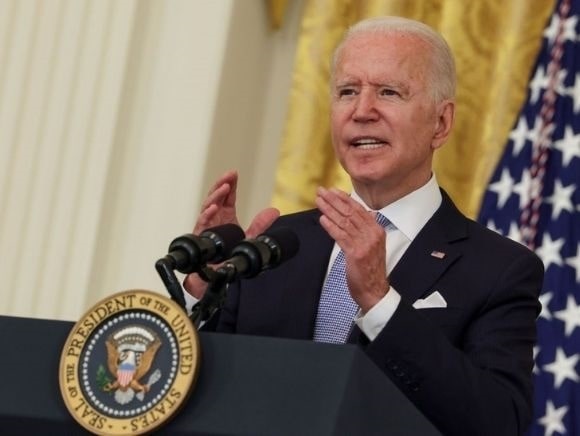President Joe Biden signaled his intention to further the federal government’s backing for American manufacturing, a bipartisan move supported by his predecessor, Donald Trump. While speaking at a truck manufacturing facility in Pennsylvania, the president announced that the current requirement of products purchased by the federal government being 55% American-made should be increased immediately. Officials from the administration expanded on the president’s intent, noting that the proposed rule would immediately increase the requirement to 60% and eventually 75% by 2029. To the despair of small-government advocates, data reveals that the federal government is the world’s largest purchaser of consumer goods.

(Photo by Jonas Walzberg/picture alliance via Getty Images)
In addition to the proposed increase, proposals to inform the federal government about specific products threatened by inadequate international supply chains have also been introduced. According to the White House, any of these goods would be given preferential support, though no specifics about what this support entails were provided. Weeks earlier, the Department of Defense had announced its intention to expand rare mineral mining critical to supply chains for semiconductor manufacturing, the pharmaceutical industry, and electric vehicle manufacturing. Should President Biden go forward with his plan, it would supplement the Senate’s own effort to strengthen American technological manufacturing in the recently-passed US Innovation and Competition Act (USICA).
Corporate Welfare?
Under President Trump, efforts to prioritize American manufacturing were made in his Buy American and Hire American executive order issued in 2017. In 2020, the Trump administration even successfully persuaded companies like Taiwan Semiconductor Manufacturing Co. to build a factory in Arizona last year with the help of promised government subsidies. This move angered Intel CEO Pat Gelsinger, who argued that the actual problem of stalling American intellectual property development was being ignored in favor of simple government bankrolling.
 Many supporters of the former president welcomed any renewed support for American businesses, but critics have had various issues with the top-down orders being issued. For one, free-market conservatives have long condemned China’s propping up of its industries with subsidies, government preference, and industrial interventions. To them, it appears as if the United States is firmly siding with corporate welfare. The Senate’s approval of $52 billion in subsidies for semiconductor plants is not an insignificant figure, and skeptics argue that there would be nothing to stop the ever-expansive federal government from widening the scope of “strategic” industries in the future. Current reports show the Biden administration appears to be treading along the same path, with a few critical differences regarding regulations and oversight. The current proposed executive order echoes Trump’s own rhetoric. However, Biden also wants any waivers to the order to be posted publicly on the web, where they can be contested by other competing businesses. Competing over a general government contract would incentivize private contractors to cut costs while also keeping as much production in the country as possible to elevate their position.
Many supporters of the former president welcomed any renewed support for American businesses, but critics have had various issues with the top-down orders being issued. For one, free-market conservatives have long condemned China’s propping up of its industries with subsidies, government preference, and industrial interventions. To them, it appears as if the United States is firmly siding with corporate welfare. The Senate’s approval of $52 billion in subsidies for semiconductor plants is not an insignificant figure, and skeptics argue that there would be nothing to stop the ever-expansive federal government from widening the scope of “strategic” industries in the future. Current reports show the Biden administration appears to be treading along the same path, with a few critical differences regarding regulations and oversight. The current proposed executive order echoes Trump’s own rhetoric. However, Biden also wants any waivers to the order to be posted publicly on the web, where they can be contested by other competing businesses. Competing over a general government contract would incentivize private contractors to cut costs while also keeping as much production in the country as possible to elevate their position.
Rules requiring the federal government to buy American sound great at first, but in reality, the average American consumer is hardly even impacted by these changes. None of the Biden administration’s proposed requirements involve prioritizing domestic merchandise for the average consumer. Detractors continue to argue that America is treading dangerously close to ever-expansive government intervention in the free market, setting a misguided precedent likely to be abused in the future. Throwing money at a problem doesn’t always work when it comes to public policy, and propping up homeland security as a catch-all justification for continued government intervention remains a questionable policy choice that may come back to haunt us in the years to come.
~
Read more from Jose Backer.




